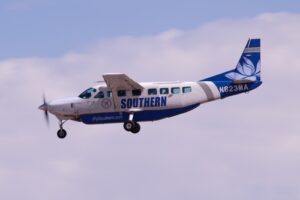
As Congress continues to work on legislation to reauthorize the Federal Aviation Administration, four Republican senators urged their chamber’s commerce committee leaders to prioritize maintaining the U.S. Senate provisions of Essential Air Service (EAS) in any package that advances to the floor.
The EAS program guarantees that small communities served by certificated air carriers before airline deregulation maintain a minimal level of scheduled air service, according to the U.S. Department of Transportation (DOT), which is mandated to provide eligible EAS communities with access to the National Air Transportation System.
Generally, this is accomplished by subsidizing two round trips a day with 30- to 50-seat aircraft, or additional frequencies with aircraft with nine seats or fewer, usually to a large or medium-hub airport, according to DOT.
“Since its inception in 1978, the EAS program has been a critical resource for the nation in linking rural communities with major markets and economic opportunities,” U.S. Sens. Deb Fischer (R-NE), Shelley Moore Capito (R-WV), Roger Wicker (R-MS), and Marsha Blackburn (R-TN) wrote in an April 9 letter sent to U.S. Sens. Maria Cantwell (D-WA) and Ted Cruz (R-TX), chair and ranking member, respectively, of the U.S. Senate Commerce, Science, and Transportation Committee.
“Additionally, [the program] provides residents of our rural areas with transportation options on which families rely,” they wrote. “These airports are imperative to rural communities, where public transportation options are limited compared to their urban counterparts.”
Currently, the U.S. Senate and the U.S. House of Representatives are reconciling the bipartisan Federal Aviation Reauthorization Act of 2024, S. 1939, which the Senate Commerce Committee approved on Feb. 29.
The senators are concerned about the final bill including cost-share language from the House bill that would call for enforcing a 5 percent cost-share beginning in fiscal year 2027 for EAS airports, according to their letter.
“Such an amendment would have detrimental effects on numerous EAS-served communities, potentially jeopardizing their access to essential air services,” they wrote. We “urge you to uphold the Senate’s version of the EAS language during conference with the House and ensure it is maintained in the final bill.”



